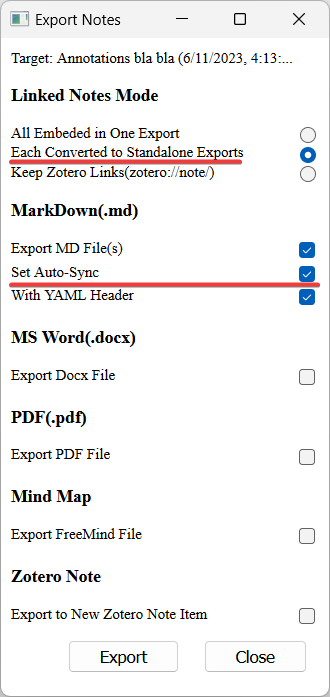Sorry I hate this kind of ambiguous language too. Will keep it in mind next time.
I was actually talking about the Zotero Better Notes that @macrospect mentioned. I followed your recommendation and didn’t try out AidenLX’s Obsidian Zotero plugin.
Now to the Zotero Better Notes plugin.
May I ask you @macrospect if you’re able to read Chinese? I’ve struggled quite a bit through the documentation (everything is in the GitHub page, the wiki is outdated) and it’s tough for me to put things together. The machine-translated Chinese-to-English is hard to wrap my head around. There’s also a few discussion about the plugin on the Zotero forum (example) but iirc, it’s mostly “urgh you can use the built-in browser translation to understand the docs” (which I tried and then gave up).
Regarding feature #1 — 2-way syncing between Zotero built-in notes and md files in Obsidian — admittedly it’s really cool, but there’s a lot to demand. Some cons:
- If you’re doing simple 2 way sync it should be fine, but if you’re introducing hierarchy (think nested lists), the notes look messed up. There’s a blank line with between every item in the list. The tab character is replaced by 4 spaces.
- The notes imported into Zotero can have the color with them too (really cool). However, it uses complex html markup for everything (even for links such as
([AAA, 2020, p. 263](zotero://select/library/items/WLZ2BHQE)) ([pdf](zotero://open-pdf/library/items/GQ225JF7?page=271&annotation=3TYA8J98))were wrap around complex html syntax, which make your notes looks super cluttered.
But it’s really easy to set up 2-way sync and this is a separate feature than using the template, so you can just try it without the template features. Remember to choose this option (as @macrospect mentioned above) when you set up the autosync
I didn’t try the template because I didn’t understand how to get it to work, so can’t comment on that.
